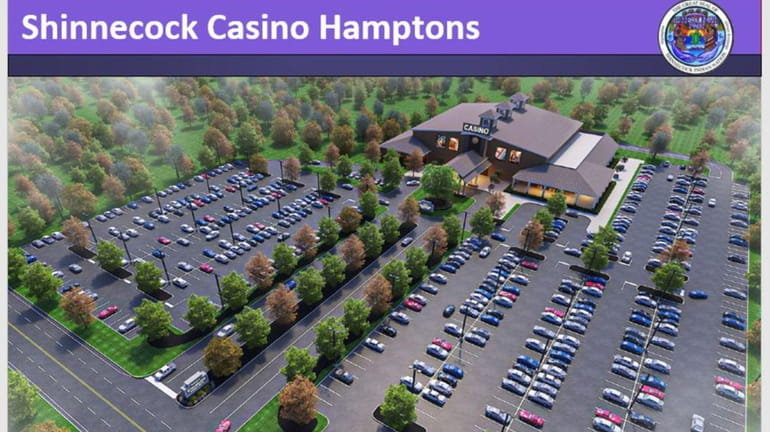76,000-square-foot casino would be the first on Shinnecock tribal land

A rendering of the planned Shinnecock gaming facility that would include a bingo parlor, 1,000 video lottery terminals and 30 "Texas Hold 'em" table games. Credit: Shinnecock Indian Nation
The Hamptons' first casino will include a bingo parlor, 1,000 video-lottery terminals and 30 Texas Hold 'em table games, according to officials from Shinnecock Indian Nation and their partners, who plan to announce their venture Wednesday.
The 76,000-square-foot casino would be built on tribal land just off Montauk Highway, they said.
The planned Class II gaming facility is expected to be a vital economic engine for the Southampton tribe as it seeks to increase its self-sufficiency through greater employment, expanded tribal government, including a new police force, and ancillary businesses that will grow as the casino venture does.
The casino will be wholly owned by the Shinnecock Nation, with an agreement in place that provides for outside funding and strategic planning from Tri-State Partners of New Jersey and the Seminole Tribe of Florida, owner of the Hard Rock Hotel and Casino chain.
The casino, which already has approval of the tribe after a supermajority vote for a new economic redevelopment zone in December, will be built in a section of land fronting Montauk Highway in what had been scheduled to be a medical cannabis facility. The project, which remains a tribal priority and an active, ongoing pursuit, has been stalled awaiting cooperation with the state.
Bryan Polite, chairman of the Shinnecock Nation’s council of trustees, said the casino will be a vital economic engine for the tribe’s more than 800 members, as well as the local community, which will benefit from higher winter-traffic levels.
The casino will have both on-site and remote parking, said Jack Morris, principal of Tri-State Partners. In a statement, the Seminole Tribe said it "supports the efforts of the Shinnecock Nation to secure the right to open a gaming facility to provide the Nation with much needed economic development."
The Seminole said gaming has been a "vital tool for economic development and self-determination for Indian tribes across the country.".
The Seminole Tribe has worked with the Shinnecock Nation and Tri-State for over a year, the partners said, helping it obtain the necessary approvals from the Department of Interior and the National Indian Gaming Commission. In addition, the Seminole has "provided financial support and technical assistance to the Nation, including financial models and designs."
Polite said the tribe awaits only approval of an environmental impact study from the Gaming Commission to begin construction, which he said is expected start this summer and would take 12 to 14 months to complete.
Morris said in an interview while the first phase of the project will entail exclusively Class II gaming, "there could be other phases of the project" in the future that include hotel rooms and other economic drivers.
Currently, the tribe’s on-reservation businesses include smoke shops and convenience stores, some selling food and other items, but there’s a plan for a tribal gas station and convenience store on Sunrise Highway near the site of the tribal billboard/monuments.
Polite said the casino and other projects are all being developed to "ensure the nation can be self-sustaining." It will help fund a new tribal police force and court system, social welfare programs, and help balance the tribe’s government, which has been impacted by COVID and the loss of its annual powwow in 2020.
"It will fundamentally transform the way of life on Shinnecock," he said.
The Shinnecock tribe is "committed to bettering the lives our people and creating some kind of economic boom for the local economy," Polite said. "We feel very strong this project is going to achieve both those goals."
Polite said "significant" work has already been done, most in the pre-planning stages.
The casino won’t require a compact or formal agreement with the state, Polite said, noting only Class III gaming with table games requires it.
Polite said he expects some locals may have "qualms" with the facility, adding the tribe and its partners are already doing traffic studies, surveys and others measures to handle increased traffic. He said the tribe would "work in a way that’s not just beneficial for Shinnecock but also the outside community."
Morris said the project will entail "a lot of construction jobs," some of which may be done by off-island firms. Training and education for tribal members and others will be a key component of the project, Morris said.
Protests resume at Stony Brook ... Hempstead sues MTA over congestion pricing ... SCPD graduation ... Sci-Fi renaissance
Protests resume at Stony Brook ... Hempstead sues MTA over congestion pricing ... SCPD graduation ... Sci-Fi renaissance

